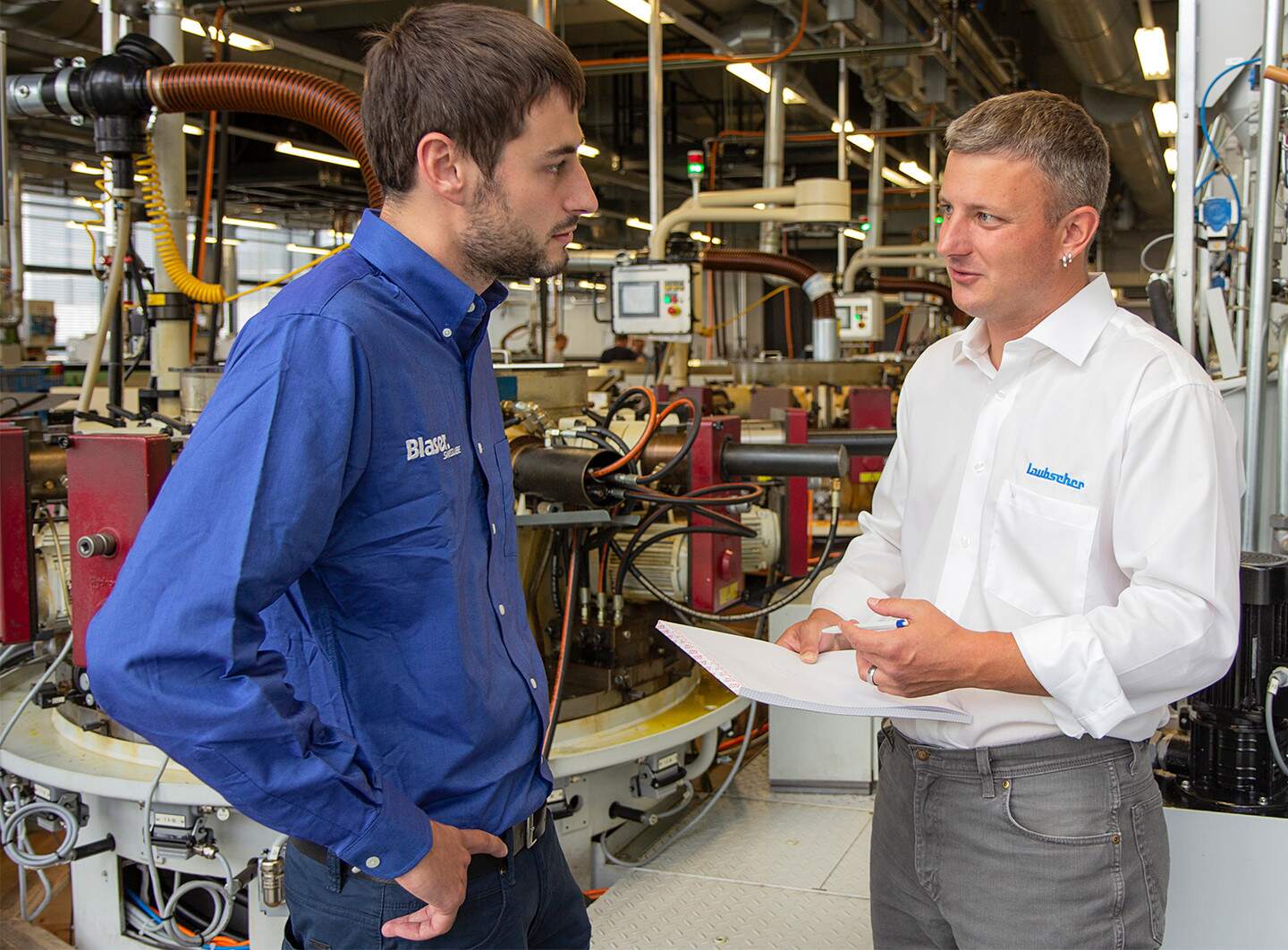
by Blaser Swisslube | May 27, 2021 | Customer Cases
Complete process optimization with your coolant partner Blaser Swisslube Discussion of Simon Balz from Blaser Swisslube and Mirko Laubscher from Laubscher More than just a coolant supplier – for its customer Laubscher Präzision AG, Blaser Swisslube reproduced and optimized the entire production process in its in-house technology center. The results are convincing: a reduced cycle time of over 16% and an extended tool life of about 15%. Laubscher Präzision in Switzerland The collaborative project began in 2016. Blaser Swisslube’s goal was to rebuild an existing production process with a Pfiffner rotary transfer machine in its in-house technology center and optimize it step by step. Assessing the machining strategy and tools was just as much a part of the process as the choice of the ideal metalworking fluid. “In our technology center, we can not only test newly developed metalworking fluids extensively, but also simulate our clients’ processes. We have to remember that factors such as machinery, strategy, tools, materials and coolants are decisive influences on the machining process”, explains Christoph Wüthrich, head of Blaser Swisslube’s technology center. Initial situation Industry: Medical technologiesManufacture of: Precision-turned partsOperation: Various – milling, drilling, turning, sawing, etc.Material: Inox 1.4305Machinery type: Pfiffner rotary transfer machine In order to produce precision-turned parts, Laubscher Präzision AG has multiple Pfiffner rotary transfer machines in use. “We wanted to take a look at the entire process with our coolant partner, Blaser Swisslube, to have a more productive process”, says Mirko Laubscher of Laubscher AG. An improvement of the soft factors, such as low foam, transparency of the cutting oil and reduction of the oil mist was equally important to Laubscher. Throughout the entire test phase in the Blaser Swisslube technology center, tools and coolants were tested and process steps were analyzed and optimized. “We took our time to test each parameter individually so that we could improve the production process sustainably”, explains Simon Sakica, Application Engineer at Blaser Swisslube. “Furthermore we replaced a universal cutting oil with a transparent, latest-generation, high-performance cutting oil”, Sakica adds. Laubscher oversaw and supervised the project’s development. This included regular meetings and visits at Blaser Swisslube. Achieved optimizations The 1.5 years invested in research were well spent....
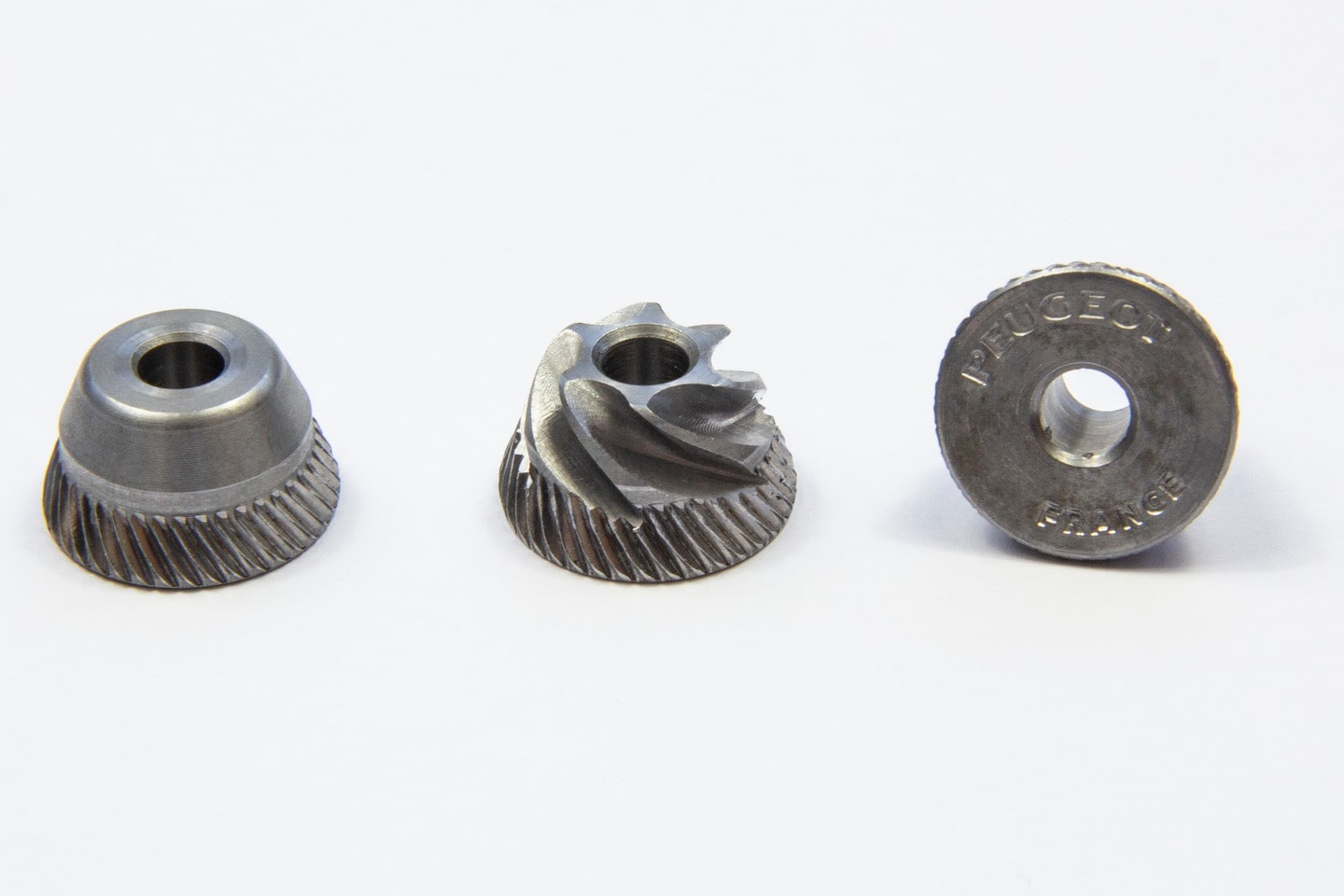
by Blaser Swisslube | May 27, 2021 | Customer Cases
Blasomill GT 22 – The cutting oil with a tangible added value View of the production process The world-renowned pepper mills by PSP Peugeot are sold in over 80 countries worldwide. The Liquid Tool by Blaser Swisslube helped PSP Peugeot improve their production process considerably by saving tool costs, omitting deburring and improving surface quality. PSP Peugeot had heard of the Liquid Tool by Blaser Swisslube. The ability to achieve a measurable added value thanks to the optimum metalworking fluid evoked their interest. They wanted to improve the cycle and tool life in the demanding machining process of gear hobbing, in which the “poire” (pear), made of stainless steel S250, is ground. Recording all parameters Ghislain Jouffroy, Methods Engineer at PSP Peugeot contacted Blaser Swisslube France. He was willing to perform machining tests with the recommended metalworking fluid Blasomill GT 22 on a TECH-TECH machine for three months. Blaser specialist Christophe Simon intensively oversaw this test phase, systematically recording all processing parameters. The workpieces are aligned, guided, machined and then ejected by a spiral vibrator – everything is automated. “In addition to the metalworking fluid, we also switched the milling tool from HSS to carbide,” explains Christophe Simon. Per machine and year, 1.2 million “poires” are produced during shift operation, with a cycle time of 13 seconds per pear. View of the production process An impressive result The improvements thoroughly impressed PSP Peugeot. Thanks to the Blaser metalworking fluid, 90,000 instead of the previous 30,000 workpieces could be produced – a plus of 200%, reducing the tool costs by a whole 21%. But that’s not all. Because the workpieces no longer heat up during the hobbing process, no more brows are formed, making the deburring process superfluous. “The Blasomill GT 22 releases the air very quickly, does not foam and is the perfect choice for this machining process at PSP Peugeot,” concludes Christophe Simon. The litre price of Blasomill GT 22 is higher than that of the previous oil, but the various savings result in net savings of EUR 25,173 per year. Ghislain Jouffroy is overjoyed: “Everything is running like clockwork and we are very satisfied.” What the future will bring PSP Peugeot has found the right coolant partner in Blaser Swisslube. They do not want to rest on their laurels, but want to continuously optimize their processes together. Thus, for the next project, they want...
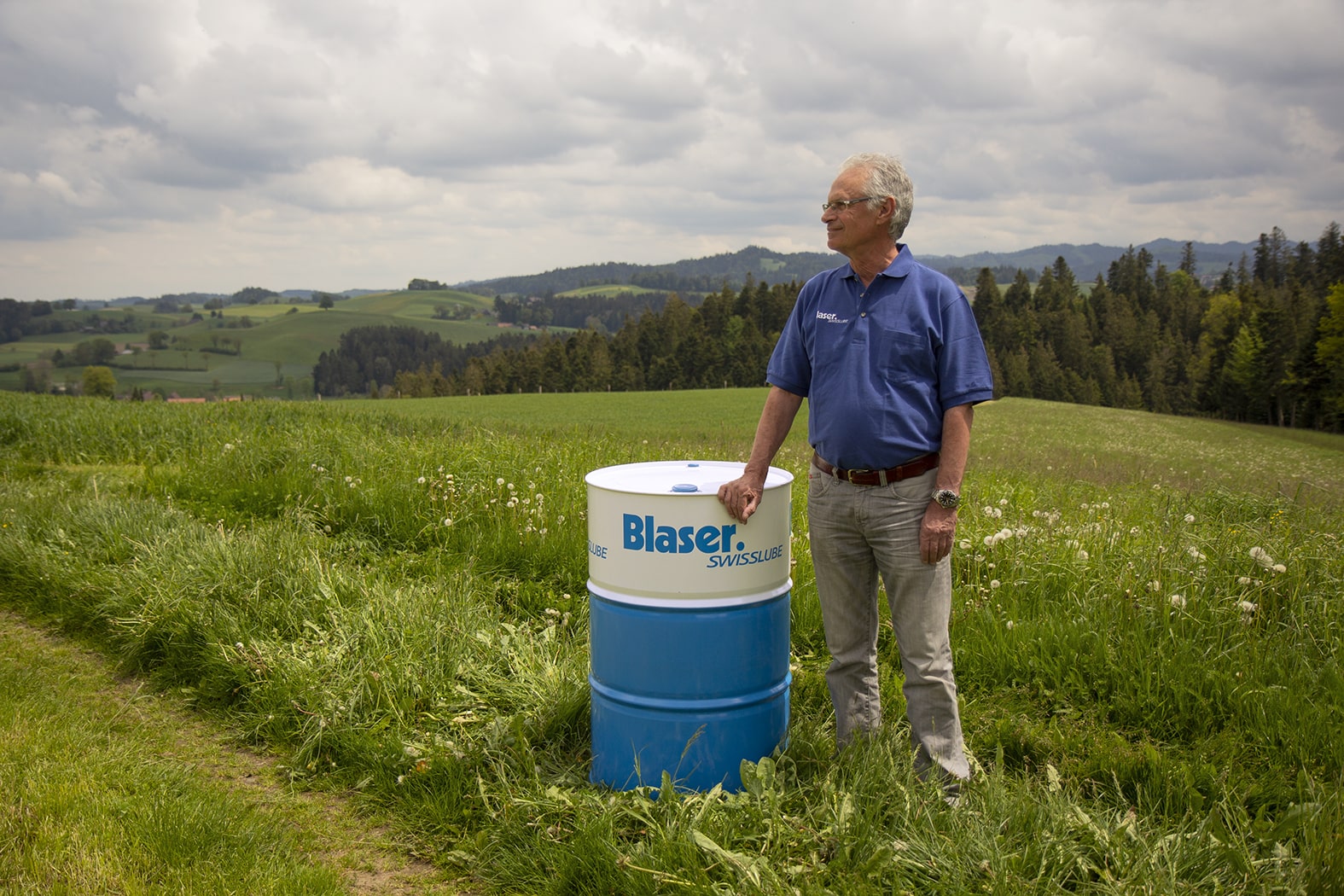
by Blaser Swisslube | May 27, 2021 | Customer Cases
20 years of sump life – and still going strong! Our retired Sales Manager Hans Niederhaeuser personally filled the central system at Tata Motors in Pune with Blasocut 4000 Strong. The Blaser coolant Blasocut 4000 Strong has a sump life of over 20 years now! It all begun in 1998 when Tata Motors in Pune was looking for a high-quality metalworking fluid. Now Punit Gupta, Managing Director of Blaser Swisslube India, is looking back on a long-lasting success story and is heading for the next 20 years. How it all started Tata is a market leader and pioneer in making commercial vehicles like Trucks for ages. In 1998, they decided to enter the passenger car market with their Indica car. For their car production, the plant in Pune was investing in high-performance technology for aluminum machining. Thus, they were looking for competent partners. Their main requirement was a high-performance material removal and also using a very good coolant system. After thorough research, it was decided by Tata to start a partnership with Blaser Swisslube. This defined the beginning of Blaser Swisslube India, followed by the founding of a subsidiary, Blaser Swisslube India in 2001. At the beginning of this partnership, Mr. Hans Niederhaueser (now Retd. Sales Manager) from Blaser Swisslube Switzerland came to India to personally fill the central system. “I still remember how it all started. I flew to India in May 1998 to fill the central system with 80’000 liters of our Blasocut 4000 Strong. I am very happy to see that the emulsion is still stable and running smoothly for 20 years now. By avoiding a huge quantity of coolant disposal from the last 20 years, the contribution to the greener planet is priceless,”, says Hans. The Blasocut Bio-Concept for a greener Planet Blasocut 4000 Strong is a coolant out of the Blasocut line. The Blasocut products have an excellent human and environmental compatibility. The technology has been able to contribute to the robust process of machining, high productivity, and better machining quality. In today’s manufacturing world, it has become a global requirement for all manufacturing industries to contribute towards a Green Planet. There is a high level of awareness about the ill effects brought in by many factors of industrialization. Sustainable technologies like the Blaser Swisslube Bio-Concept work in perfect harmony with nature. With the Blasocut Bio-Concept, emulsions need no tank side addition of bactericides. They stay inherently...
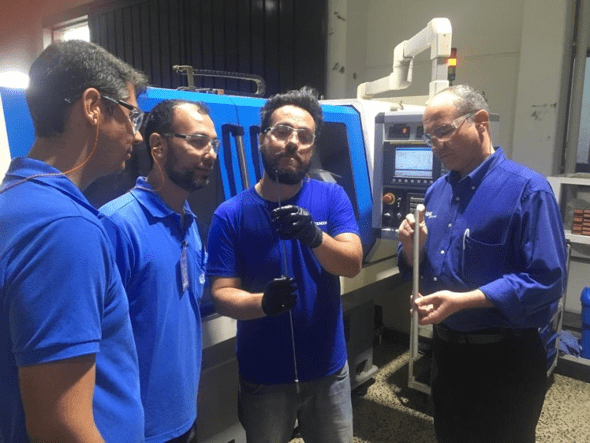
by Blaser Swisslube | May 27, 2021 | Customer Cases
Blaser’s Liquid Tool helps orthopedics manufacturer lower costs, increase productivity It is no secret that productivity is a key element for success in manufacturing. What not everyone knows is that the solution to increase productivity is not always linked to costly investments, major structural reforms or a significant increase in staff. Often, a single solution can make important improvements in productivity while making the manufacturing process more economical. This was the case in a productivity improvement project by Hexagon Orthopedics, one of the five largest Brazilian companies in the manufacture of implants and orthopedic instruments. (Left to right) Blaser Swisslube Engineers José Geraldo Bregagnolo and Carlos Henrique Ganzella and the Hexagonn team of Rodrigo Tukaça de Souza, Anderson Donizete Negri and Tiago Rodrigues Junior. Hexagon Orthopedics, based in ltapira, in the State of Säo Paula, Brazil, has grown year after year since its founding in 1988. Due to its strong commitment to the medical area and its customers, the company has become one of the leading national manufacturers of orthopedic implants. Hexagon credits much of its success to its employees, which is reflected in the low personnel turnover at the company. However, in 2016 Hexagon Orthopedics had a problem: due to high manufacturing cycle time and low tool life in deep drilling, Hexagon outsourced part of its production, generating undesirable additional cost in its final product. In his search for a solution to this problem, Claudia Barbosa, industrial manager for Hexagon Orthopedics, requested a visit from the technical team at Blaser Swisslube Brazil, based in Santo Andre, Säo Paula, to assess the situation. According to Barbosa, “The main objective was to improve the performance of the deep drilling operation with a diameter of 2.7 mm, but the use of vegetable oil was also desired as it was more ecological, among other benefits.” Blaser Swisslube is a Swiss company specializing in providing fluids for machining. Family owned, it was founded in 1936 and has since become a global company employing 600 people worldwide. Blaser Swisslube operates in more than 60 countries, including Brazil. A thorough analysis of the situation revealed that the HTT Shangay special drilling machine used in the deep drilling operation had a cycle time of 248 seconds and the tool life of the 2.7-mm diameter cannon drill was about 30 percent of the ideal. A detailed analysis...
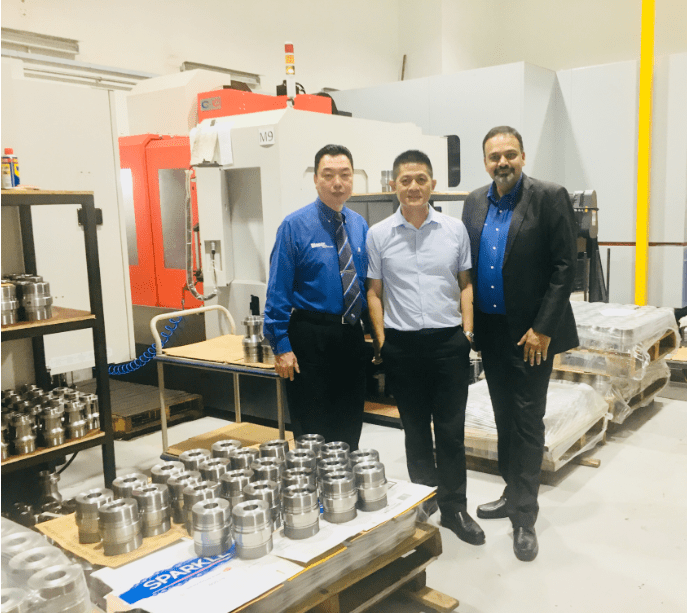
by Blaser Swisslube | May 27, 2021 | Customer Cases
Synergy 735 – convincing in regards to maintenance and better view of the machining operation Components processed at Yida Precision Engg. using Blaser’s Liquid Tool Cleaner machine, oil free coolant and better maintenance? Steven Boh was very keen to know more about the new Blaser development Synergy 735. Especially the easy maintenance of the coolant and the possible improvements in the workshop were tempting. After a test-run, he switched all of his 17 machines to the new synthetic coolant. Longer tool life and a cleaner workshop stand out. Established in 2006, Yida Precision Engineering is an ISO-certified company operating from a 6,000 square feet facility and supports customers with cost-effective, time-sensitive and quality assured precision engineering solutions. The Singapore based company is employing around 50 people and is serving industries like Oil and Gas, Aerospace, Semi-Conductor as well as consumer electronics. Yida Precision Engineering always thrives for continuous improvement and serves their customers in the best possible way. Taking in account all parameters The responsible on-site Blaser contact, Johnny Chia visited Yida Precision Engineering. “At the customer site, first we evaluate the given parameters such as water quality, materials to be machined and the processes. Then we recommend the appropriate coolant solution, “explains Johnny Chia the typical Blaser-approach. As the Blaser experts were convinced, that the new Synergy 735 is the perfect match for Yida Precision, they convinced Steven Boh for a trial. Steven Boh is a long-time customer of Blaser’s and knows what an important role the optimal coolant plays. Before he decided to test Synergy 735, he was using an oil-based product. He was keen to experience the Synergy 735, which Blaser Swisslube recommended to him. So, the first machine was filled. Over a period of four weeks, Steven Boh and his team tested the new coolant in-depth. Blaser Swisslube representatives at Yida Precision Engineering Convincing results with Synergy 735 “Synergy 735 convinced us with easy maintenance, better tool life even for exotic alloys. Better surface finishing and better visibility trump up. As the color of the coolant is transparent, we have a better view of the operation,” explains Steven Boh. But that’s not all. He also saves money due to the lower concentration of Synergy 735. Thanks to the ideal formulation of Synergy 735, the coolant ensures long-term cleanliness of the machine....
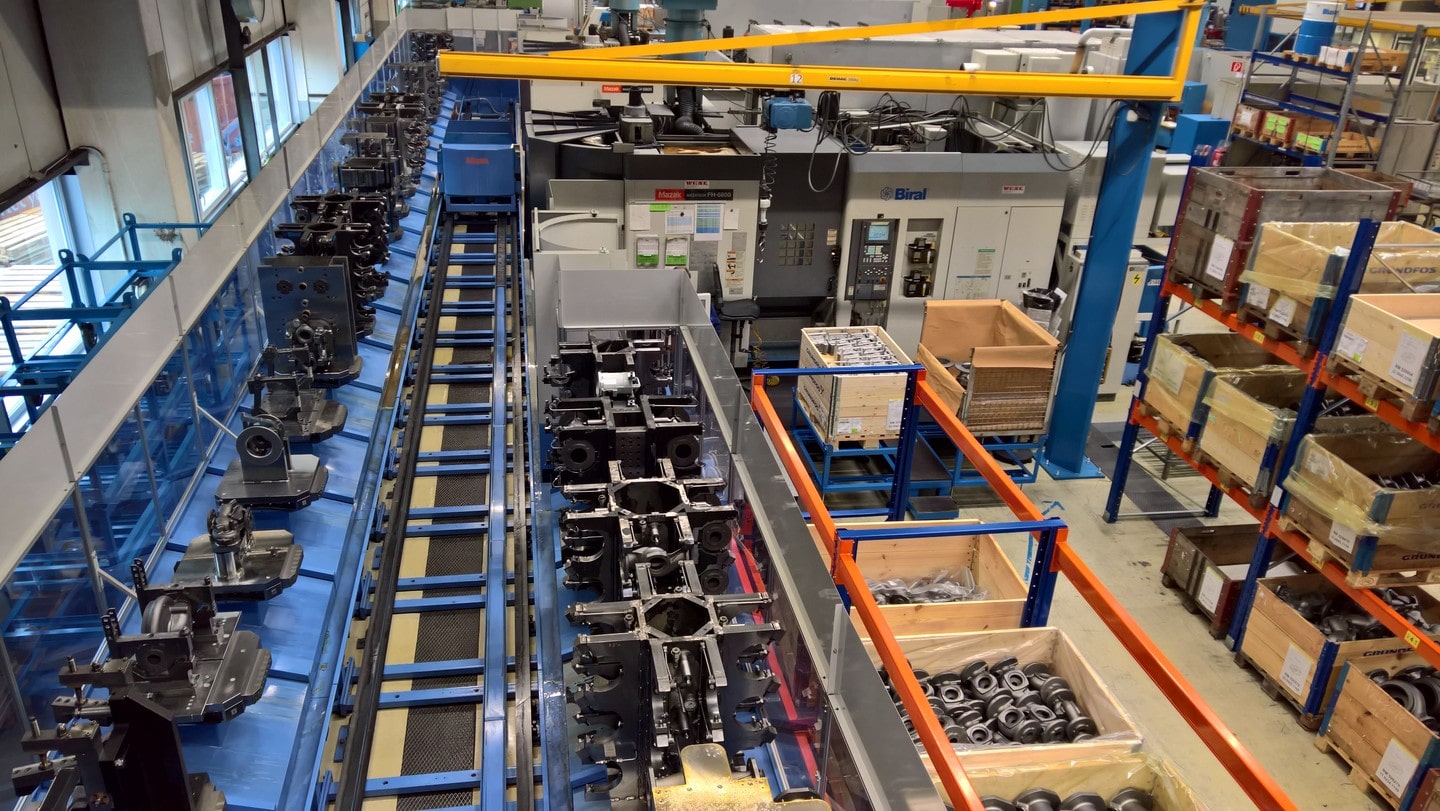
by Blaser Swisslube | May 27, 2021 | Customer Cases
Sustainability is the primary objective Biral Headquarters in Münsingen, Switzerland The situation facing Biral AG, the leading Swiss pump manufacturer, in its production hall was anything but optimal, with an unstable emulsion and unsatisfactory coolant service life the least of the company’s problems. The greatest concern was the skin irritation suffered by three employees. Analysing the various manufacturing processes and switching to the optimal Blaser metalworking fluid transformed production into a sustainable process. Even more importantly, skin problems are now a thing of the past. View of the shopfloor Biral AG, headquartered in Münsingen, was founded in 1919. From the outset, the company built up its reputation as a manufacturer of state-of-the-art pumps for building services, municipal applications and industry. The 165 employees are committed to the goal of producing the best pumps around. The manufacturing process involves a comprehensive mate-rials mix. The pump housings are made from grey cast iron. Bronze is machined for various components, while aluminium and steel are also produced. Grey cast iron machining accounts for the majority (around 80%) of the production processes at Biral AG. Aluminium and steel make up around 15%, and there is one machine for working bronze. “It is not easy to handle such a diverse mixture of materials,” explains Martin Haas, application engineer at Blaser Swisslube, Switzerland. It was no surprise, therefore, that the situation in the pump manufacturer’s production hall was anything but optimal. The service life of the coolant being used was unsatisfactory, and the emulsion had to be adjusted at regular intervals by add-ing additives. Three employees complained of skin irritation caused by the unstable metalworking fluid. Faced with these problems, Biral staff were reminded of a metalworking fluid seminar at Blaser Swisslube. Biral contacted Blaser in search of a sustainable solution. Liquid Tool Blaser’s experts scrutinised all aspects of the situation in the production hall. “In combination with materials, tools and processes, the right metalworking fluid becomes a Liquid Tool. Our objective was to get the skin irritation under control and sustainably improve Biral’s processes by choosing the right product,” says Haas. The analysis focused in particular on the materials mix. We identified green discolouration, often found when working bronze. We therefore had to find a product that was also appropriate for...







Recent Comments